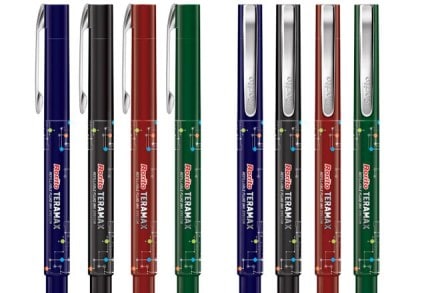Chennai-based GM Pens International is the country’s largest manufacturer of writing instruments. The last few months have been full of action for the company. It has been the licensee of Reynolds Pens of the US for almost 20 years. Last May, GM Pens decided to end the relationship and strike out on its own. Reynolds has been a household name for years among those who use pens and particularly students. Indrakumar Mahendran, the joint managing director of the company, says that it took them 2-3 years to take that decision. “Reynolds allowed us to use the name. There was no technology transfer.
They would not let us export our products. We decided it was time to go global. Our competition, including Cello, Luxor, Link and others, were exporting while we, as market leaders, could not do so.” The company launched their products under the brand name Rorito. Why this name? “The roller in the ballpoint pens rolls well and the pens write well too.” It was able to transfer the brand equity from Reynolds to Rorito successfully and retain its turnover in nine months. The management had a tough time selling the idea to its staff, banks and others about its decision.
Also Watch:
That it was able to convince Sachin Tendulkar who was the brand ambassador for Reynolds to agree to continue to promote Rorito as well helped. “Tendulkar endorsed a new product for the first time,” says Mahendran. The size of the writing instruments industry in India is around Rs 5,500 crore and the organised industry accounts for Rs 3,500 crore. GM Pens has a market share of 15-16% in the organised sector. It is the only company that offers the entire range of writing instruments—such as ballpoint pens, fountain pens, sketch pens, industrial pens and pencils.
“Reynolds introduced fine writing to India. It helped a commodity become a branded product. We have kept introducing new products on our own as we have build a very strong R&D department.”
Some of the company’s interesting innovations are the Rorito Flymax Gel Pen, a waterproof gel pen which provides a comfortable combination of smudge-free, smooth and fine writing. It has a special Japanese waterproof ink. Rorito Fantaflo is an extremely smooth writing ballpoint pen with a unique low viscous ink and a 1-mm ball to make writing bold and prominent. For students, Rorito has a refillable fluid ink pen with technology from Schneider of Germany. Called Teramax, it allows children to write more than 70 pages without a break. Schools, particularly in Tamil Nadu, still insist that children use fountain pens in their early years.
A recent introduction is a unique refillable fluid ink ballpoint pen, again with technology from Schneider, with a special tip for those who want smooth writing. “The pen writes so smoothly that it feels like a fountain pen,” says Mahendran. It has been especially engineered after years of R&D by Schneider. “It is designed to provide maximum comfort and control for the fast-writing consumer.”
The company has invested substantially in building a large manufacturing base with facilities in Chennai and Pondicherry. It employs 1,600 people directly and 1,400 indirectly. It makes 25 lakh pens everyday and hopes to increase it to 30 lakh by the middle of this year. GM Pens sells through 5 lakh retailers and around 10 lakh small and medium outlets stock the product. It also has its own 30 franchisee outlets, called Writeside, which were originally set up to promote all their products. It hopes to end the year with a turnover of Rs 500 crore.
GM Pens’ state-of-the-art R&D facility in Chennai is considered one of the most sophisticated in the writing instrument industry worldwide. A lot of development work in necessary as different parts of the country want different kinds of pens. A small piece of wire goes through 21 operations before it gets transformed into a ballpoint pen. The ink has to last in various climatic conditions. The ink comes from Germany and does not dry fast. The company has tie-ups with Schneider and Dokumental of Germany and Mikuni of Japan.
GM Pens’ marketing and R&D work together. The marketing teams make a blind study before new products are introduced. The results go back and forth between marketing and R&D, and they get fine-tuned. Mahendran says no product of theirs has ever failed. Robomax, which is an expensive pen as far as products for students are concerned (`50), was recently introduced in New Delhi and enjoyed a success rate of 95% from day one. So far, the maximum sales have come from pens retailing between `5 and `10. The company’s aim has been to provide affordable pens at world-class quality. Mahendran believes that people are now ready to buy more expensive pens.
The writing habit is supposed to be dying. Do pens have a future?
“The use of pens has come down in Europe and the US. The story is different in developing countries, especially in India. Students in schools and colleges continue to use pens. From the turn of the century, the same question keeps coming up. The Indian market has been bucking the trend and has been growing 10% every year. In advanced countries, students use laptops and iPads in classrooms. This is not going to happen in the near future in India, where students move from pencils to pens. I don’t see any problems for the next 15-20 years.” The company has sold over 900 crore pens since its inception in 1995.
GM Pens has faith in the writing culture. The company has started an initiative called Rorito Writewiz—a formulated training methodology for teachers and students—which offers a complete handwriting curriculum free of cost. It has been designed after nearly two decades of research. The company is working with many schools in Tamil Nadu on this project.
